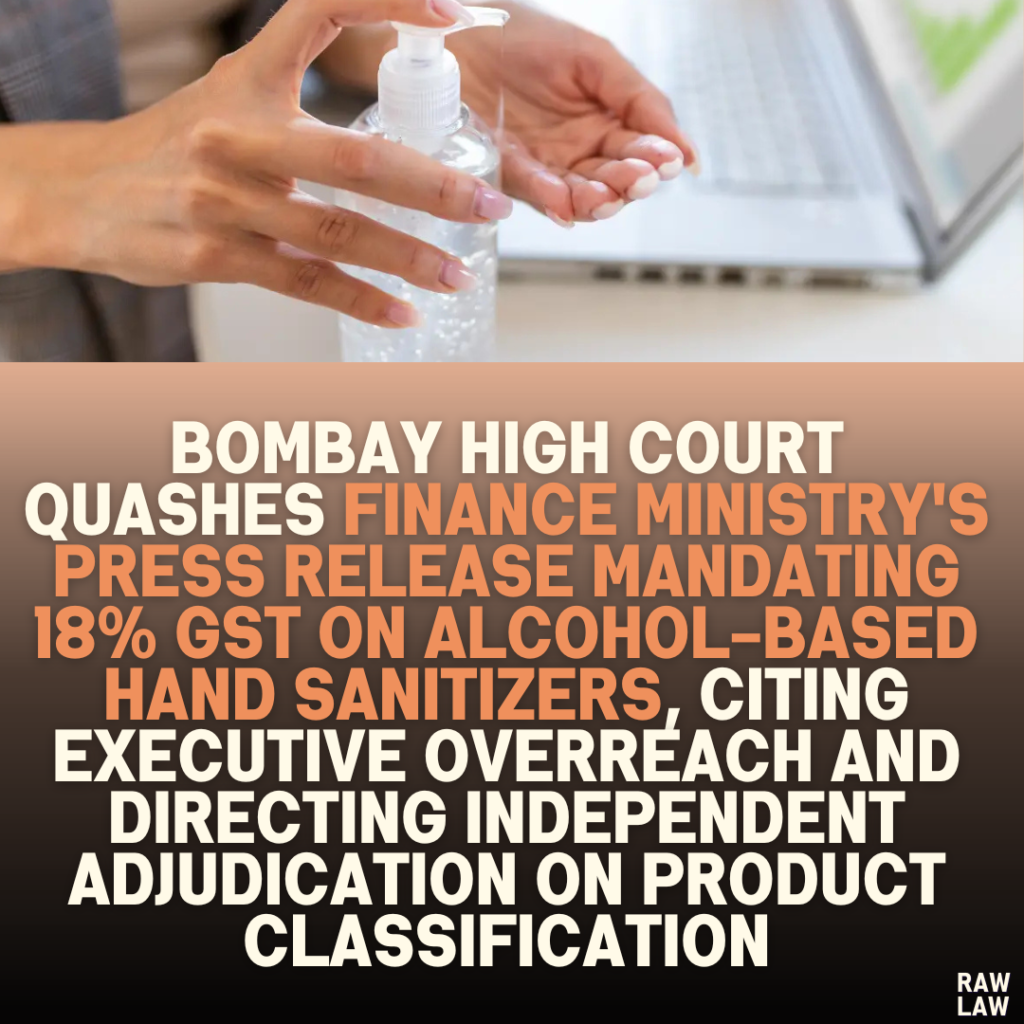Court’s Decision
The Bombay High Court partially allowed the petition, setting aside the Finance Ministry’s press release dated July 15, 2020, which classified alcohol-based hand sanitizers as “disinfectants” subject to an 18% GST rate. The court ruled that judicial and quasi-judicial bodies must determine product classification independently, without influence from executive instructions. It directed that if the impugned show cause notice is pursued, it must be adjudicated based on the law and its merits, uninfluenced by the press release.
Facts
The petitioner, engaged in trading alcohol-based hand sanitizers, contended that their products, classified as “medicaments” under HSN 3004 in previous tax regimes, should not be subject to the higher GST rate applicable to “disinfectants.” A press release issued by the Ministry of Finance in 2020 classified alcohol-based sanitizers as “disinfectants,” leading to an 18% GST rate. The petitioner argued that this classification was arbitrary and should be determined by adjudicatory authorities rather than through executive instructions.
Issues
- Whether the Finance Ministry’s press release classifying hand sanitizers as “disinfectants” exceeded executive authority.
- Whether the classification of the petitioner’s products falls under the judicial and quasi-judicial domain rather than executive mandate.
Petitioner’s Arguments
The petitioner argued that the Finance Ministry’s press release overstepped its authority by dictating product classification. It contended that this determination should be reserved for judicial or quasi-judicial bodies. The petitioner also pointed out inconsistencies within government departments regarding sanitizer classification, citing a clarification from the Directorate General of Health Services treating sanitizers as “drugs” under the Drugs and Cosmetics Act, 1940. Additionally, the petitioner referenced a Supreme Court judgment classifying similar products as “medicaments.”
Respondent’s Arguments
The respondents argued that the Finance Ministry’s press release was a legitimate executive instruction under Articles 73 and 77 of the Constitution, intended as guidance for proper GST application. They emphasized that the press release does not conflict with statutory provisions and is within the executive’s power to guide tax levies.
Analysis of the Law
The court examined whether the Finance Ministry’s press release could mandate tax classification in a judicial matter. It found that while executive instructions may offer administrative guidance, they cannot direct judicial or quasi-judicial authorities in exercising their statutory duties. The court highlighted that judicial independence prevents the executive from imposing binding interpretations of statutory provisions without a legislative basis.
Precedent Analysis
The court reviewed several judgments supporting the independence of judicial and quasi-judicial authorities from executive influence in tax matters. It referred to:
- Parle Agro Pvt. Ltd. v. Union of India: Where the GST Council’s recommendations on product classification were found to be non-binding.
- State of Jharkhand v. Govind Singh: Reaffirming that the legislature is functus officio after enacting a law and cannot later interpret it through executive directions.
- Bengal Iron Corporation v. Commercial Tax Officer: Declaring that administrative circulars are not binding on courts or quasi-judicial authorities.
Court’s Reasoning
The court concluded that the Finance Ministry’s press release was an executive overreach, attempting to dictate judicial and quasi-judicial functions that fall within the domain of statutory authorities. The court held that the executive cannot influence product classification, a judicial matter involving statutory interpretation. It emphasized the doctrine of separation of powers, asserting that the executive’s power is limited to guidance and cannot impose mandatory classifications.
Conclusion
The court quashed the Finance Ministry’s press release, instructing that adjudicatory authorities must decide the classification of hand sanitizers independently and without influence from the impugned press release.
Implications
This decision underscores the importance of maintaining judicial and quasi-judicial independence from executive directives in matters requiring statutory interpretation. It establishes that executive instructions cannot mandate product classifications in tax matters, reaffirming the separation of powers and reinforcing that classification issues must be resolved by adjudicatory bodies under the law.




Pingback: Allahabad High Court Quashes Notification Including Village Barsana Dehat in Nagar Panchayat, Citing State’s Failure to Address Unique Objections on Loss of Rural Employment Benefits - Raw Law
Pingback: Delhi High Court Sets Aside Blacklisting and OCI Cancellation Orders, Emphasizes Harmonious Application of Foreigners Act and Citizenship Act with Fair Procedures for OCI Cardholders - Raw Law